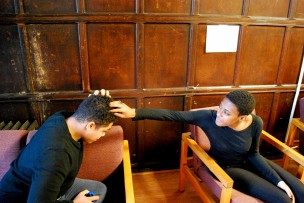200 Church hosted an event on Friday called “You Can Touch My Hair” as a way for students to appropriately ask any questions about other people’s hair.
In an effort to spread knowledge about different types of hair, 200 Church hosted an event called “You Can Touch My Hair” on Friday, Oct. 31. Dara Robinson ’15, the main organizer of the event and the Residential Advisor of 200 Church, planned the event in order to give students a chance to ask questions they might have about hair that has a different texture from their own as well as to challenge generalizations and misunderstandings surrounding this type of embodied difference.
The event was inspired by a public art exhibit of the same name held in New York City this past summer that confronted people’s often uninformed fascination with black women’s hair. The exhibit and subsequent short film were produced by un-ruly.com, an online resource focused on hair care and products for black women.
“Whether it’s seven-year old Tiana Parker getting sent home from school for wearing locs or Dante De Blasio’s Afro being credited for giving his father a boost in the New York City mayoral race, Black hair is consistently subject to unsolicited fascination,” a press release about the film reads. “As the final extension of a bold two-day public art exhibit held in New York City this summer, ‘You Can Touch My Hair, a Short Film’ takes a glimpse into this fascination and how Black women, who are often its subjects, feel about it.”
Robinson echoed this sentiment, saying that the event offered people a chance to ask questions and voice concerns in a supportive environment.
“I just think that questions about hair are plentiful but they either don’t get asked or they don’t get answered properly…and I think that hair is very, very simple but it really does have a big effect on people’s lives,” Robinson said.
According to Robinson, people who are asked to have their hair touched are usually are offended by the question and want to know why somebody would want to touch their hair.
“Even when people ask, ‘Can I touch your hair?’ then the person says, ‘Why do they need to touch my hair?’ and they’re offended that they’re even asked, so it’s just a very touchy subject,” she said. “I feel like this [event] just gets rid of all the awkwardness, all the offenses and things like that, and we willingly present ourselves so that you can learn a little something.”
One student who attended the event, Henry Prine ’18, only recently started thinking about the role that hair plays.
“I think it’s interesting to look at how hair plays a role with identities, cultures, and the fact that sometimes people view hair as something they can go up and touch without realizing its significance,” Prine said.
One of the participants, Taylor McClain ’17, said she did not mind having her hair touched and felt she could contribute to the educational effort by allowing people to touch it.
“I think it’s a good conversation to start,” McLain said. “I think it’s a good place for people to come and be able to express something that they are curious about. But they are awkward in the encounters and everything, so I just wanted to support it and help it happen.”
Ryan Dobrin ’18, another participant, said he also felt comfortable with others touching his hair.
“I don’t know if I see it as an issue, but I think it’s something that happens to a lot of people so we might as well address it,” Dobrin said.
Arron Luo ’18 agreed with McLain, adding that he hoped that students would use this opportunity to ask questions in an effort to reduce stereotypes.
“I think it’s an event that might actually work to dispel a lot of the stereotypes around people’s hair and to remove the mystery around what other people’s hair [is] like,” Luo said.
Robinson added that the event was an opportunity for participants to learn more about their own hair.
“I think that a big thing with hair is that a lot of black people and people of color don’t appreciate their hair as much as they should,” Robinson said. “I think they also don’t really know things about their own hair, so it’s nice to have people with natural hair…somebody who’s had a perm their whole life can even come in and learn what their hair could look like if they didn’t have the perm.”
Robinson pointed out that hair is a topic not usually discussed on campus, adding that this discussion branches out into larger conversations about race and identity.
“I think that at Wesleyan sometimes we forget the issues that don’t seem as important,” Robinson said. “We’re talking about gender-neutral bathrooms and things that seem like big huge things, so when you think about something as simple as hair, I don’t think a lot of people thing, ‘Oh yeah that is a big deal.’ But people forget that there are still children getting expelled from middle school because they have dreadlocks.”
According to Robinson, hair takes on different levels of importance to people as they define their own identities.
“I don’t know if it’s a topic that is talked about in terms of how is the way other people are viewing my hair—how does that oppress me?—but I think that definitely with people of color, especially black women on campus, we do share a lot about our hair because we’re doing so much with it,” Robinson said. “I don’t think that we really talk about the baggage that comes along with it.”
